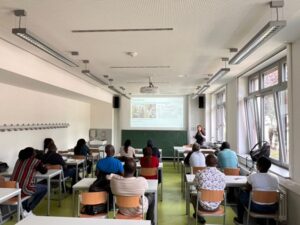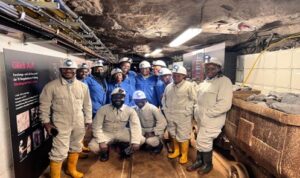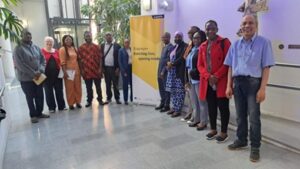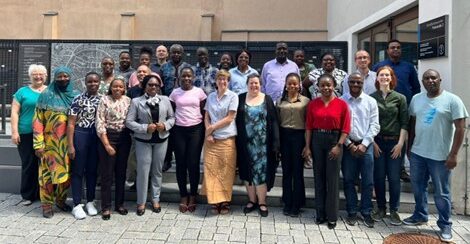In a major stride toward sustainable mining and community empowerment, three (3) faculty members from the University of Environment and Sustainable Development (UESD), Somanya in the Eastern Region of Ghana, joined an international team of scientists and educators in Germany from June 17 to July 1, 2025, for a workshop under the YEMAYA Erasmus Project. The UESD team members are Prof. Edward Wiafe Debrah (Ag. Pro Vice-Chancellor); Dr. Fatimah Araba Eshun (HoD-Department of Geography and Earth Sciences); and Dr. Samuel Joe Acquah (Head, Central Laboratory).
The workshop brought together 16 scientists—five men and eleven women—from Ghana (UESD and UMaT) and Kenya (Taita Taveta and Machakos Universities) to share knowledge and strengthen collaboration on restoring degraded mined lands and enhancing livelihoods in mining-affected communities.

At the heart of UESD’s project presentation was a transformative agenda: “Restoring Degraded Mined Lands and Enhancing Livelihood Options for Mined Villages in Ghana.” The initiative leverages remote sensing, environmental testing, community training, and alternative livelihood strategies—from agroforestry and circular economy solutions to climate resilience and clean energy innovations.
Learning from Germany’s Mining Experience
Participants benefited from high-level academic exchanges, including lectures from the Vice Rector and industry experts. The team visited laboratories and underground mines, including a bio-leaching technology site, where indigenous microorganisms are used to extract minerals—offering a sustainable alternative to traditional mining practices.

A key session focused on licensing and compensation frameworks for mining damages, delivered by Professor Bongaert, and visits to institutions like Helmholtz Institute, which pioneers sustainable circular economy models and resource-efficient mining technologies.
Entrepreneurial Innovation in Focus
In collaboration with SAXEED—a network supporting university spin-offs—the delegation explored strategies to build entrepreneurial ecosystems in African partner Universities. They emphasized the need for innovation hubs, incubators, student mentorship, and product-based research, paving the way for UESD and its partners to nurture the next generation of eco-conscious entrepreneurs.
Building Skills for Disruptive Times
A highlight of the workshop was the session on “Education in Times of Disruptive Change,” which urged universities to prepare students for the knowledge age through courses in circular economy, de-carbonization, biodiversity regeneration, and systems thinking. Communication and self-leadership training were also delivered to enhance team collaboration and critical thinking.

Strengthening the YEMAYA Network
The workshop concluded with a strong call to deepen partnerships through formal MoUs, organize quarterly webinars (starting August 2025), and establish YEMAYA Clubs across partner Universities to sustain engagement. Each university will host and co-host sessions to foster ongoing collaboration and research dissemination.

In a show of academic excellence, UESD’s Ms. Henrietta Nabiebakye received high praise for her laboratory work on soil and plant contamination analysis—despite coming from a social science background—demonstrating the interdisciplinary spirit of the project.


